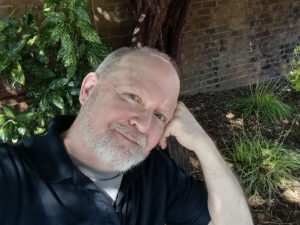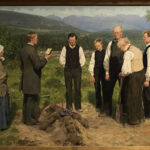Johann Wolfgang von Goethe trudges along Kickelhahn Mountain’s overgrown paths near Ilmenau, Germany. The octogenarian loves this town on the northern edge of Thuringian Forest. He’s been here several times over the years. Now he returns in grief.
Ten months earlier, Goethe’s forty-year-old son August had contracted smallpox while traveling in Rome. His condition had been complicated by meningitis and an enlarged liver due to years of heavy drinking. August had died on October 26, 1830. Goethe had received the news on November 10 and for weeks was unable to interact with others or write letters (he usually pens several each day). On November 25 he had suffered a pulmonary hemorrhage that nearly killed him.
Now in August of 1831 Goethe takes his grandsons, Wolf and Walther, to Ilmenau as much to enjoy its beauties as assuage their shared sorrow. One day he leaves the boys with his servant, Krause, and asks local administrator Johann Christian Mahr to guide him along some lesser-known mountain trails. Their way is gentle, though arduous. The Kickelhahn is 861 meters high.
Morning fog soon dissipates as they reach a hilltop turret. The sun reveals majestic beech, fir, and birch trees. Hints of autumn nip the air. For Goethe the sights and smells bring memories at once joyous and painful. He and August often visited Ilmenau together.
The poet pauses further up the path. He recognizes a small two-story hunter’s hut made of wood beams and clapboards. “Is that little forest house still here?” he whispers to Mahr.
Fifty years before, in 1780, Goethe had visited this same cabin in a time of distress and lament. He was undergoing some convoluted affairs of the heart, but much more importantly, his beloved sister Cornelia had died some three years earlier, in June of 1777. He still keens the loss. Goethe speaks of her as a sturdy, reliable root that has been chopped away. Cornelia’s branches, as the poet describes himself, are left to wither without her. A month later Goethe writes this poem:
The gods, endless, give all
to those they love, entire:
all our joys, endless; all
our pains, endless, entire.
Perhaps the gods are too extravagant in their largesse, Goethe sighs. They are by nature endless, and so give endless joys, entirely, to those they favor and, alas, endless pains entirely as well. Here Goethe is expressing a sense of disillusionment and betrayal that is common after loss. Mourners often blame God for the death of their loved ones and may deride his apparent lack of concern.
That September of 1780 Goethe spends eight days alone in the Kickelhahn hunter’s cottage. Leaves are starting to change, but for now it is still summer, a week after the poet’s thirty-first birthday. On September 6 he composes by candlelight a hushed evocation of the calm found in nature. It is often considered the most perfect lyric piece in German verse. Goethe inscribes it in pencil on the wooden wall of the hut:
Over all peaks
lies peace,
in every tree-
top you sense
barely a breath;
birds are calm in the wood.
Only wait, soon
you too will rest.
Now fifty years later, on August 27, 1831, a day before his eighty-second birthday, Goethe climbs the Kickelhahn one last time. He has often said that those we love are engraved in memory, where the past is ever present. The pain of his son’s death is still fresh. He and Mahr come upon the old hunter’s lodge. Goethe strides confidently through blueberry bushes surrounding the walls. Inside he heads directly for a steep stairwell that leads to the upper story. Mahr tries to help. “I’m quite capable,” Goethe laughs, waving him away. He climbs alone.
There it is, penciled words still vivid on the wall: “Over all peaks.” This is the first time he has seen the poem since composing it five decades before. Goethe once wrote to his friend Friedrich Schiller that he feels closest to nature when he follows his own nature. Now alone in the second story, he recalls wading through wet meadows by the Saale River, catching frogs with August when his son was eight years old. Past and present combine in a poignant arc. Goethe weeps.
The next morning he enjoys a quiet, subdued, but pleasant birthday with his grandsons. Girls in their finest white dresses recite poetry. A brass band plays “Now Thank We All Our God” (Nun danket alle Gott). The poet is reminded of a verse he composed four years earlier:
For the Eternal rules this earth; His gaze, the seas;
lions become lambs; waters return in peace.
Swords halt before they strike, frozen mid-air
by hope, by faith, a miracle of Love in prayer.
Goethe dies six months later.
I too am a bereaved father. This may be why “Over all peaks” resonates with me. It has been translated many times, often quite well, yet none (mine included) fully captures Goethe’s mixture of grief, despair, and surprising hope. Before my daughter died I enjoyed this famous lament. Now I recognize it.
“Grief can be described as a natural human reaction,” observes psychologist John Archer (University of Central Lancashire), “since it is a universal feature of human existence irrespective of culture.” Like Goethe, in sorrow and remembrance I too return to the familiar.
For example, in 2013, my daughter and I are searching for a particular tea. She suggests a place on Rosewood Drive in Columbia, South Carolina, USA. No one knows downtown like Jess. She’s right. We pick up a unique herbal blend and move on to other business of the day.
Jess dies two years later of a fentanyl-laced heroin overdose.
Recently I used my last bag of the “Heartburn Soother” blend we bought that day. It’s twelve years old but surprisingly fresh. Breathing in its fragrance, I can almost step into that shop again. Smell has a direct neural pathway to the brain, but it reaches deeper than that. This cup of tea is steeped in leaves, memory, and tears. It soothes a different kind of heartache.
“Our most elusive sense, smell reaches more directly into memory and emotions than other senses,” writes Boyd Gibbon with National Geographic. Howard Ehrlichman (Queens College) and Linda Bastone (Purchase College) take this a step further, suggesting that odors have a role to play in our affective reactions, that is, responses relating to feelings, moods, remembrance, and attitudes. This explains why smell is often thought of as our emotional sense, according to Trygg Engen (Brown University): “Functionally, smell may be to emotion what sight or hearing is to cognition.”
Since Jess died, my sense of smell is heightened in a plethora of ways. Honeysuckle seems richer, deeper, greener somehow, rather than merely floral or sweet. Cinnamon, beloved companion, tickles my nose, then overwhelms. I am lost for a moment in delight that a pinch of something common is suddenly so uncommon. “Smells are surer than sounds or sights to make your heart-strings crack,” writes Rudyard Kipling in his poem “Lichtenberg” (1901):
All that I shouldn’t ha’ done, God knows!
(As He knows I’ll do it again) . . .
It all came over me in one act
Quick as a shot through the brain.
Kipling’s regret calls to mind another aspect of Goethe’s grief. August had grown weary of living in his famous father’s shadow. As well he might. “So far as I know,” observes W. H. Auden, “Goethe was the first writer or artist to become a Public Celebrity.” There was no getting away from it.
August hopes to find independence in Italy, perhaps write his own Italian Journey as his father had done. He writes to his wife that he sees the trip as an effort to save himself. “If only you could see me now. I am so at peace, so strong again.”
Yet Goethe reads August’s letters with a critical eye. His replies are dripping with forced bonhomie: quirky, calculating, more like a reviewer than a father. He sees his son as drunken, dissolute, a weak and desperate man. Such callous thoughts haunt the poet after August’s death. “I expected the worst,” he confesses. “And the worst is what happened.”
I too know the pain and regret of estrangement. As my daughter’s addiction grew more crippling, we spoke less and less. We did not talk at all during the last eight months of her life. Around 10 a.m. on Friday, January 16, 2015, I admitted to my wife: “Each day I dread the call that Jess is dead somewhere in a ditch.” That night an overdose took my little girl.
The overwhelming remorse I feel for those lost eight months still has power to reopen old wounds. I write of mourning, and hope, and love, but in doing so I am confronted with the ineffable. Words are pale copies of a grief that is too large for expression, as Tennyson observes in his elegy for Arthur Henry Hallam:
I sometimes hold it half a sin
To put in words the grief I feel;
For words, like Nature, half reveal
And half conceal the Soul within.
But, for the unquiet heart and brain,
A use in measured language lies;
The sad mechanic exercise,
Like dull narcotics, numbing pain.
In words, like weeds, I’ll wrap me o’er,
Like coarsest clothes against the cold;
But that large grief which these enfold
Is given in outline and no more.
Goethe is often mute in the face of grief. August is his firstborn and the only one of five offspring to reach adulthood. Yet the poet barely touches on his middle-aged son’s passing in later missives. He mourns alone those he loves most dearly.
On June 6, 1816, his beloved wife Christiane dies screaming in pain from acute liver failure. Goethe weeps so continuously that his friends Friedrich and Charlotte Schiller fear for his health. He is unable to speak at the funeral.
Tennyson’s elegy may explain the poet’s silence. Some pains are ever fresh, some wounds too deep for mere conversation. Mourning in solitude is not unhealthy in itself. Instead, Goethe laments Christiane in his own way, through verse composed for her tombstone:
In vain you seek, o sun, to shine thru shrouded clouds.
The whole of my life exists to grieve her loss.
Visiting familiar locations and pausing over treasured memories may be helpful as we face a world without our loved ones. “It truly is possible to live and grieve at the same time,” writes bereaved mother Lucy Hone, director of the New Zealand Institute of Wellbeing and Resilience. In our duality of death, as she calls it, we look forward while always looking back, we need others yet value solitude, we may laugh and cry simultaneously, we miss our dead and are grateful for the time we had. Our lives have changed because of their absence.
“In a lonely wooden house, on the highest peak of the fir forest, I came upon those words again,” Goethe says of discovering “Over all peaks” five decades after writing it on the wall of a small Kickelhahn hut. “Long years have passed. I pause over what lasts, what has disappeared. Nature is eternally alive and active, it allows us to feel terrible pain for a brief time, but lets us mourn for much longer.”
This is Goethe’s experience. And mine. Our world is awash with suffering. It is also redolent of meaning, aroma, and unexpected joys. Hiking for hours and miles in the deep wood surrounding our home, I am frequently stunned by what I missed before. The tiniest flower or tallest conifer is a source of peace. Once I may have tromped past, overlooking their delicate, fleeting fragrance. Now I seek them out. Have you ever noticed the smell of trees?
______
Translations from the German are by David Bannon.
Image via Flickr






